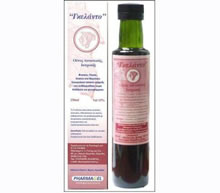
Λεξικό .. Aspirin intolerance
The syndrome of aspirin intolerance, hyperplastic rhinitis with or without polyps, and intrinsic asthma (the "aspirin triad"), has long been recognized in adults. The syndrome is of unknown etiology. Acetylsalicylic-acid intolerance is well recognized as a possible cause for exacerbating asthma. Exaggerated inhibition of cyclooxygenase has been proposed as a mechanism of drug-induced bronchospasm in aspirin-intolerant patients [1]. It has been postulated that if this could be overcome, long-term aspirin administration could improve asthma symptoms and enable reduction of the use of other anti-asthmatic drugs. The results of Dor et al (1985) suggest that ASA long-term treatment is of no help to severe corticosteroid-dependent, ASA-sensitive asthmatics.
This conclusion differs from other reports on ASA intolerance in asthma [2]. Although acetylsalicylic acid is prescribed for a broad range of diseases, it can induce a wide array of clinically recognized hypersensitivity reactions, including aspirin-intolerant asthma (AIA) with rhinitis and aspirin-intolerant urticaria (AIU) with anaphylaxis. Altered eicosanoid metabolism is the generally accepted mechanism of aspirin intolerance; the overproduction of cysteinyl leucotrienes has been suggested to play a causative role in both AIA and AIU.
Genetic markers suggested for AIA include HLA-DPBI*0301, leucotriene C4 synthase (LTC4S), ALOX5, CYSLT, PGE2, TBXA2R and TBX21. Similarly, HLA-DB1*0609, ALOX5, FCER1A and HNMT have been identified as possible genetic markers for AIU. An additional low-risk genetic marker for AIA is MS4A2, which encodes the beta-chain of FCER1. Other single and sets of two or more interacting genetic markers are currently being investigated [3]. See Aspirin idiosyncrasy
1.Bonne, C. et al: Arachidonic acid metabolism and inhibition of cyclooxydase in platelets from asthmatic subjects with aspirin intolerance.. Ann. Allergy 54, No. 2, p. 158 (1985).
2. Dor, P.J., et al: Aspirin intolerance and asthmal induction of a tolerance and long term monitoring. Clin. Allergy 15, No. 1, p. 37 (1985).
3. Palikhe NS, Kim SH, Park HS. What do we know about the genetics of aspirin intolerance? J Clin Pharm Ther. 2008 Oct;33(5):465-72
Γκέλης Ν.Δ. - Λεξικό Αλλεργίας - Εκδόσεις ΒΕΛΛΕΡOΦΟΝΤΗΣ - Κόρινθος 2013
Gelis Ν.D. - Dictionary of Allergies - VELLEROFONTIS Publications - Corinth 2013




